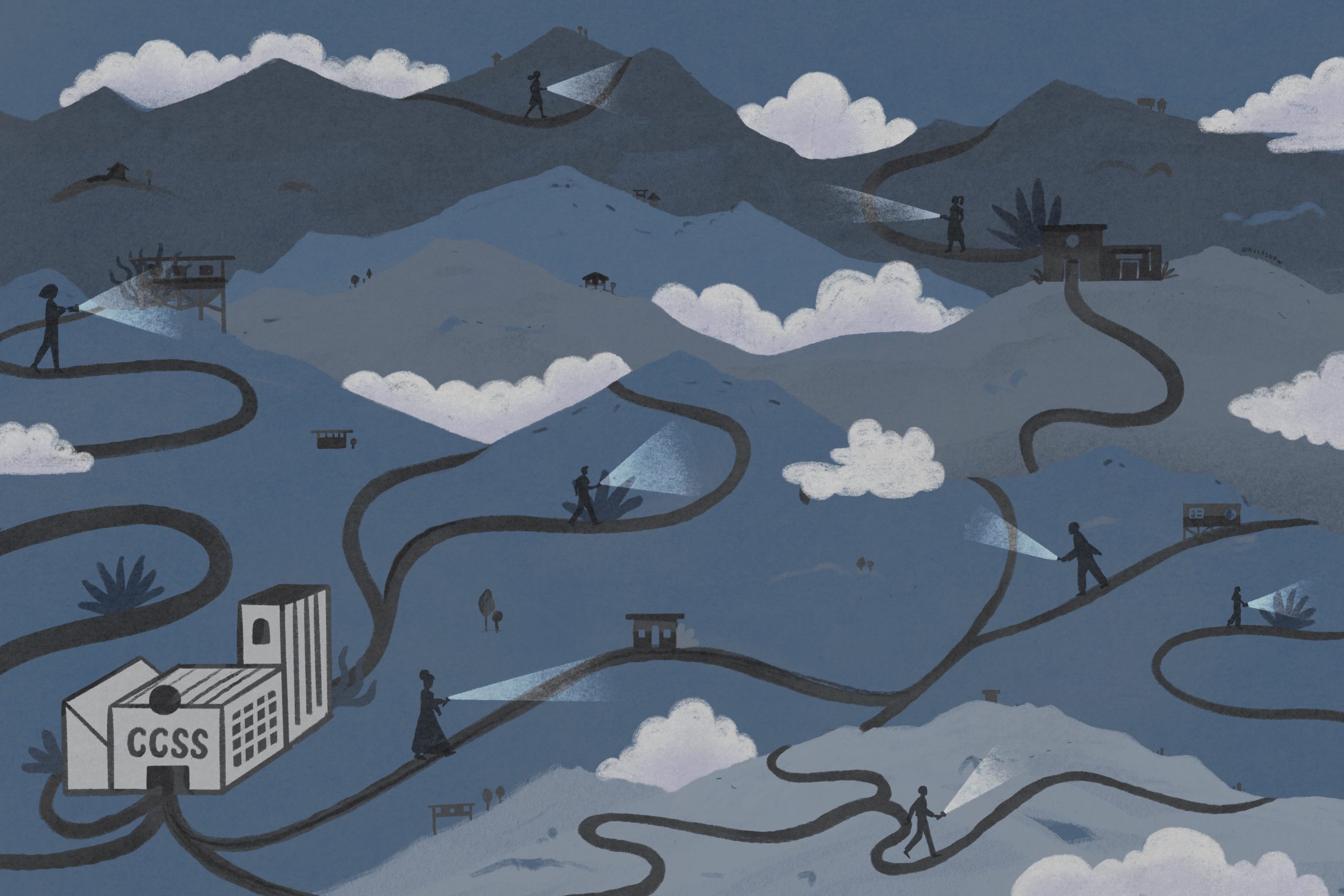“This is too much,” says Dr. Ninfa Salas. “We’re so scared.”
That’s how the Regional Psychology Supervisor for the Huetar Norte Region of Costa Rica’s public health care system describes the waves of mental health disorders and complaints on her turf.
In a country whose public health infrastructure and staffing can not only react to threats and crises, but also work proactively to offer preventative care—drawing acclaim internationally, with a 2021 article from The New Yorker as a recent example—it’s clear that mental health care has been left behind. With the Social Security System, or Caja, facing budget cuts alongside virtually every other Costa Rican public institution in the wake of the 2020 “Zero Season” that rocked the tourism industry and economy during the COVID-19 pandemic, the consensus is that major change is nowhere on the horizon. That’s despite the fact that Costa Rica’s increases in mental health disorders during the pandemic have surpassed global averages, and many involved in mental health care have called the spikes in anxiety and depression.
So what’s a local or regional health provider to do?
Part of the answer, for Ninfa Salas and the Caja, is to train primary health care providers in mental health so that they can take more effective and proactive steps in the absence of onsite specialists. The Huetar Norte is pioneering the application in Costa Rica of the World Health Organization’s Mental Health Gap Action Programme (mhGAP), which seeks to scale services for mental, neurological and substance disorders, particularly where resources are limited. In taking this step, Costa Rica is joining more than 100 countries where mhGAP has been applied, according to the WHO website.
While pandemic-era Costa Rica faces an uphill climb in improving the mental health treatment pipeline for patients, the experiences of other nations that have applied mhGAP under circumstances including war, genocide, and massive social upheaval, suggest that progress is possible.
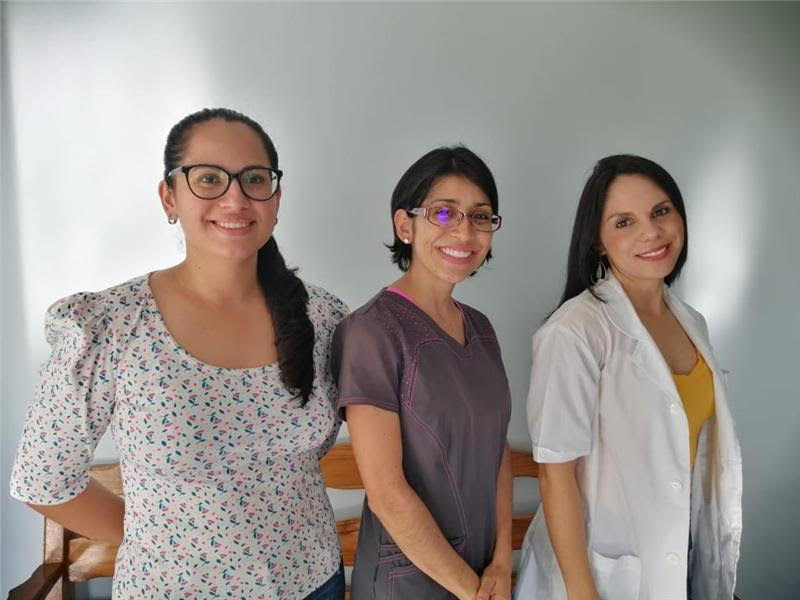
Overwhelming demand in Huetar Norte
Like most of Costa Rica’s nine Regional Public Health Administrations, or Direcciones Regionales, Huetar Norte spans a wide range of context and landscapes, from bustling Ciudad Quesada in its southernmost reaches to Los Chiles, on the Nicaraguan border. Ninfa explains that her area includes two hospitals: Los Chiles and Santa Rosa, which serves 69,142 people, and Ciudad Quesada, which serves 211,311.
For this total population of 280,453, Ninfa Salas has nine mental health specialists at her disposal. This includes three psychiatrists for the entire region, divided among the two hospitals, and six psychologists, five of which are divided among the two hospitals. Only one works in a Health Area—that is, on a local level.
“Our human resources are insufficient,” Ninfa says. “There’s no psychology on the first level of attention. It doesn’t exist in the EBAIS [local health teams] or Health Areas. For the time being, we’re just waiting. There’s a program now for Strengthening Primary Care, and we’re waiting for more human resources, both in psychology as in nutrition and dentistry.”
But mental health treatment in Huetar Norte just can’t wait.
“As of today, for example [June 6th, 2022], just one of the hospitals has had 160 referrals in three weeks—cases of anxiety, some with suicidal ideation and some without,” she says. “We’ve had five cases of suicide in the region thus far [in 2022]. Two were teenagers… last year we ended with 27 cases.”
And when primary health caregivers simply refer any mental health concern to the three psychiatrists and six psychologists at the hospitals, wait lists balloon. Ninfa says that at the smaller Los Chiles hospital, wait lists for an appointment with a mental health specialist are more than three months long (urgent or emergency cases obviously get a more rapid response). At the San Carlos hospital, some of the mental health staff are now booking appointments for September or even November.
The solution? Training local health teams to handle mental health concerns on the ground so that more cases can be addressed immediately and locally, with hospital referrals made only in cases where there’s no improvement, or where urgent or complex response is needed. Otherwise, the gap will continue.
“That’s why it’s so important to train the human resources we do have,” she says.

How the mhGAP intervention works
Dr. Salas told El Colectivo 506 during our mid-June interview that the training in Huetar Norte began on May 3rd with 43 health care workers; the first post-assessment to be conducted starting on June 28th, and a second round of training will begin with the goal of training all local health personnel in the region by the end of the year. According to Dr. Marta Vindas, the national psychology coordinator for the public health system, this first attempt at mhGAP training is one that the Caja hopes to scale up and repeat in additional regions in the future.
The WHO-based training, which in Costa Rica has been supported by experts from Spain, Guatemala and other countries, takes health care providers—doctors, nurses, social workers, pharmacists, and others—through a detailed manual. Much of its content is, in essence, a complex flow chart that guides a professional through how to assess, manage and follow up on a vast array of complaints and contexts.
It also guides them through the prescription of medication for mental health concerns, so that those steps can be taken at the local level rather than always resulting in a referral to clogged city or town hospital staff.
Marta Vindas says that while the information is extensive, Costa Rica has a huge advantage. Its local health teams, or EBAIS, might not include mental health specialists in most cases, but they are interdisciplinary. The mhGAP training allows doctors, nurses and social workers, among other staff, to prepare to work together when a mental health issue comes up for a patient.
“The medical professional is the first contact,” she says. “It’s a short period of time they’re going to provide. That’s why that sensibility is so important, that heightened awareness that will allow them to identify symptoms. The medical professional can identify it and offer active listening, but what will be really important is notifying the professional team around him or her so that coordinated attention can be given.”
Another key element of the training process is learning what resources are out there that health teams can lean on for support, Ninfa says: through the mhGAP trainings, Huetar Norte staff are learning to “coordinate with other institutions. For example, grief—there are organizations that deal with grief. So, it’s ‘you support us with this [case]. You over there, support us with awareness-raising and prevention.’”
Ninfa Salas says that the response to the training is positive, although it varies.
“Some of them speak up and talk about cases that have happened to them; they say that they didn’t even know what to do,” she explains. “They say, thank goodness we’re giving this training. Others are more defensive, because they say it’s more work.”
“There’s a little of everything,” she says.
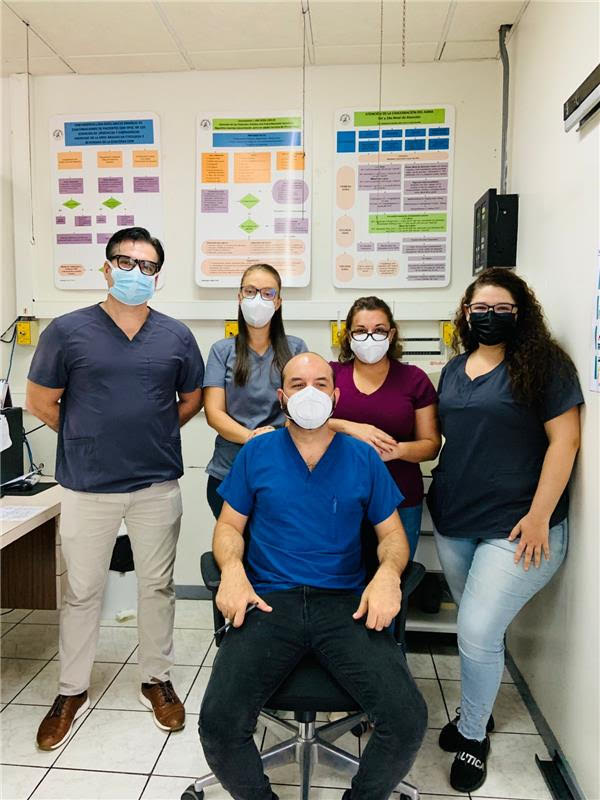
The experiences of Liberia and Colombia
It’s far too early for Costa Rica to assess any sort of impact from its brand-new training efforts, but other countries have been working with mhGAP for years.
Alexander Blackie works with Liberia Program of The Carter Center (which, through its Rosalynn Carter Fellowship for Mental Health Journalism, is a supporter of this edition). He’s the program’s Workforce Development & Sustainability Officer and says that the initiative has trained more than 500 midlevel health in mhGAP since 2014, when the program began during the Ebola crisis.
Just as the COVID-19 pandemic and its economic and social impact caused a rising tide of anxiety and suicidal ideation in the Huetar Norte region, Alexander says that the Ebola crisis caused significant mental health impact in a country that had already been rocked by coups and a 14-year war.
“Now, [health care workers] identify mental health cases and make referrals,” Alexander explained in a phone interview with El Colectivo 506. “Prior to the mhGAP, they were not able to do that. They used to stigmatize patients with mental health issues and cast them outside of the facility. After the mhGAP training, they are now accepting of mental health issues and being able to provide initial medication for them if need be.”
He says that of course, increasing the number of mental health professionals available to the population has also been an important simultaneous effort.
“Twenty years ago, Liberia had one psychiatrist,” he says. “Today, there are at least 18 mental health professionals in each county.”
Asked about the remaining challenges and limitations for the mhGAP effort, he says that the low pay of healthcare workers leads to high attrition rates. This means that oftentimes the project trains personnel who then leave, taking their newfound skills with them.
His comment is a reminder that, even if Costa Rica is catching up on mental health care, its renowned overall public health infrastructure, including coveted staff positions within the Caja, pose a significant advantage for its budding mhGAP program.
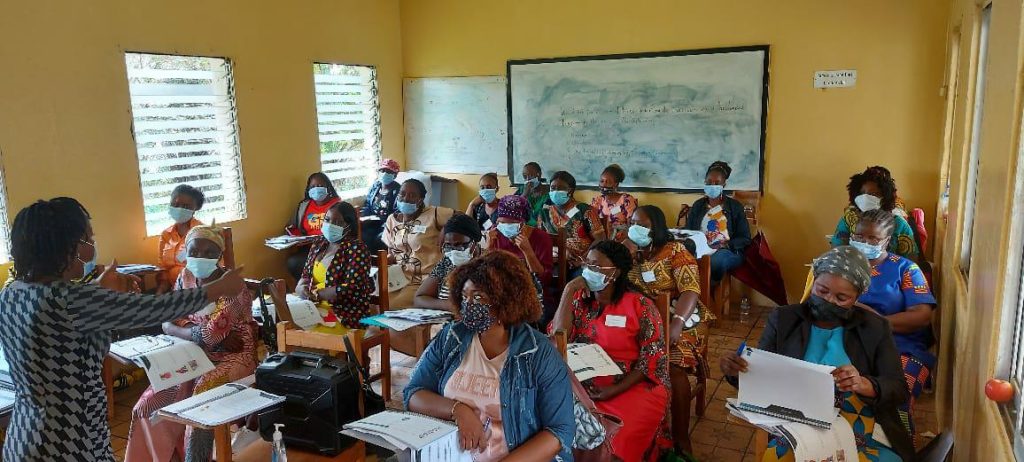
Dr. Erwin Hernando Hernández teaches at the Universidad de La Sabana in Colombia, one of the institutions that’s led that country’s mhGAP implementation. There, health authorities and their university partners took an immediate train-the-trainers approach in 2016, forming 60 trainers with support from the WHO who then went on to train 1,352 initial graduates in four major cities. Today, those trainers are now offering the 60-hour course in other regions that have requested the training.
Erwin says that the qualitative data on the impact have been positive.
“I can say that most [graduates] say they feel more confident about implementing the guide,” he says. “Most said they feel well trained.”
But what about the impact of mhGAP training on patient outcomes? Erwin says that’s very complicated to measure. So many factors affect mental health—the peace process in Colombia, for example—that it’s easy to make false correlations between changes in rates of mental health disorders, and any one factor.
Project leaders in Colombia did design a complex monitoring and evaluation system to study how the training affected delivery of health services, and began implementing it—however, it could not continue because of legal restrictions on the use of public health databases.
He says one unexpected benefit of the training has been the teamwork that Marta Vindas, in Costa Rica, referred to: having professionals from different backgrounds, such as nurses and social workers and doctors, all take the training together, has forged new connections.
“In Colombia, there’s only the doctor. The rest doesn’t exist,” he says. “But mental health requires working in a team… and having that diversity of professions. What does the psychologist think, versus the doctor, versus the nurse?”
He says that interprofessional education, where university students learn in groups that include future professionals from different branches, is now on the rise in Colombian medicine—as is mhGAP, which has been increasingly integrated into academic settings.
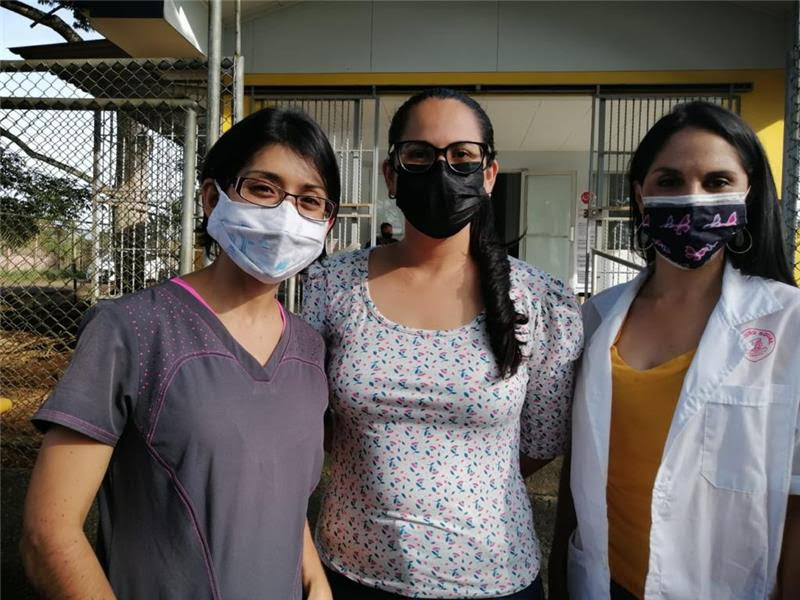
What’s ahead for Costa Rica
One of the biggest challenges for Ninfa Salas and her team, as the first medical workers in Costa Rica to implement mhGAP training, will be to assess the impact of this training on public health delivery. She says she’s up for the challenge, and will begin assessment as soon as the first round of training ends on June 28th.
Will the greater sensitivity and awareness among primary care workers—along with the road map they’ll carry into these interactions to help them figure out when to bring in medication, outside partnerships, or a referral—reduce in a decrease in patient loads and wait times at the region’s two hospitals?
Will patients who are treated locally using the mhGAP guide show progress?
And will the Caja’s evolving digital patient files and assessment measures capture that data so that Costa Rica can move towards having more complex and detailed information about it’s population’s mental health?
Ninfa says she’s going to generate as much information as she can in the wake of the country’s first mhGAP training—and that she’s committed to raising the profile of mental health care in the her region and country.
“We need to pay more attention to mental health,” says the psychologist, who has a postgraduate degree in palliative care. “There’s so much ignorance about all the cases that are on the rise because of the pandemic. Were so scared to see new cases every day… we need adequate human resources to address this need. I think we’ve left mental health care off to the side, and it’s a priority.”
She adds that seeing the mental health needs in young people, disproportionately affected by the pandemic because of school closures and the resulting lack of access to counselors, is foremost in her mind.
“Our kids, our teens, we need to take care of them,” she says. “They’re the future.”
This piece is part of our effort to create and support solutions journalism on mental health in rural Costa Rica, developed through our participation in the Rosalynn Carter Fellowships for Mental Health Journalism. In Latin America, the Fellowships are a partnership of The Carter Center, the Fundación Gabriel García Márquez, and the Universidad de La Sabana. We’re proud to be working with artist Nela Snow, the author of the illustration of this piece, during our June edition, “Mental Health.” Learn more about her work here.


